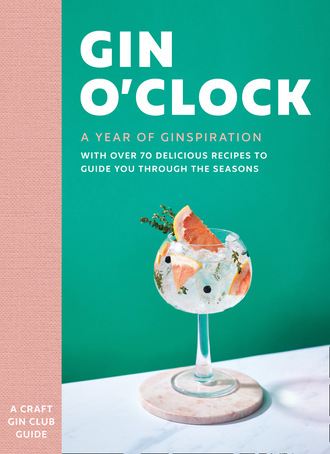
Полная версия
Gin O’clock

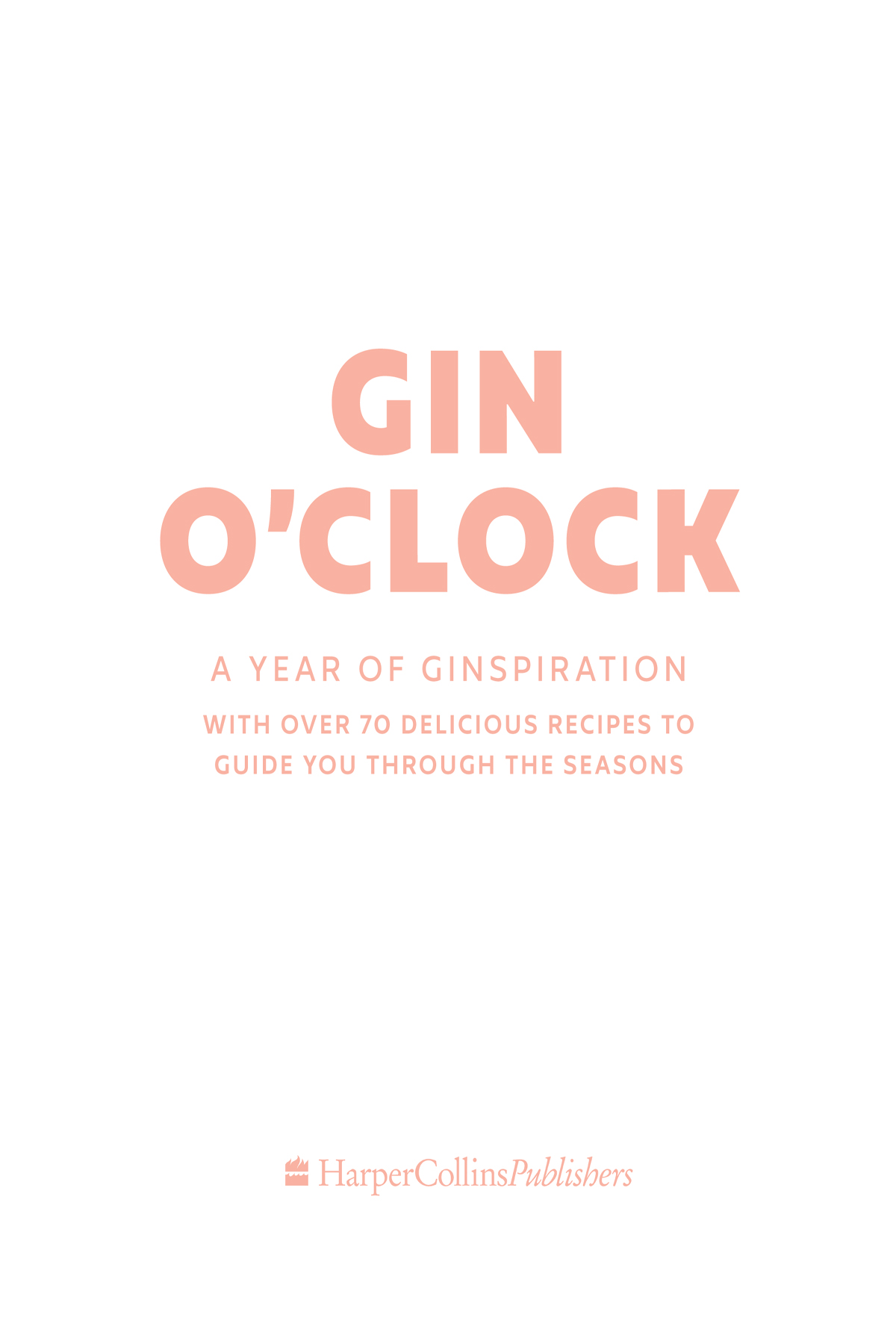
COPYRIGHT
HarperCollinsPublishers
1 London Bridge Street
London SE1 9GF
www.harpercollins.co.uk
First published by HarperCollinsPublishers 2020
FIRST EDITION
© The Craft Gin Club, 2020
Photography © Tom Regester, 2020
Cover layout design by Simeon Greenaway © HarperCollinsPublishers, 2020
Cover photograph © Tom Regester, 2020
A catalogue record of this book is available from the British Library
The Craft Gin Club asserts the moral right to be identified as the author of this work
Food and drink styling: Rebecca Wilkinson
Prop styling: Agathe Gits
All rights reserved under International and Pan-American Copyright Conventions. By payment of the required fees, you have been granted the nonexclusive, non-transferable right to access and read the text of this e-book on screen. No part of this text may be reproduced, transmitted, downloaded, decompiled, reverse engineered, or stored in or introduced into any information storage retrieval system, in any form or by any means, whether electronic or mechanical, now known or hereinafter invented, without the express written permission of HarperCollins e-books.
Find out about HarperCollins and the environment at www.harpercollins.co.uk/green
Source ISBN: 9780008378851
Ebook Edition © May 2020 ISBN: 9780008378868
Version 2020-05-07
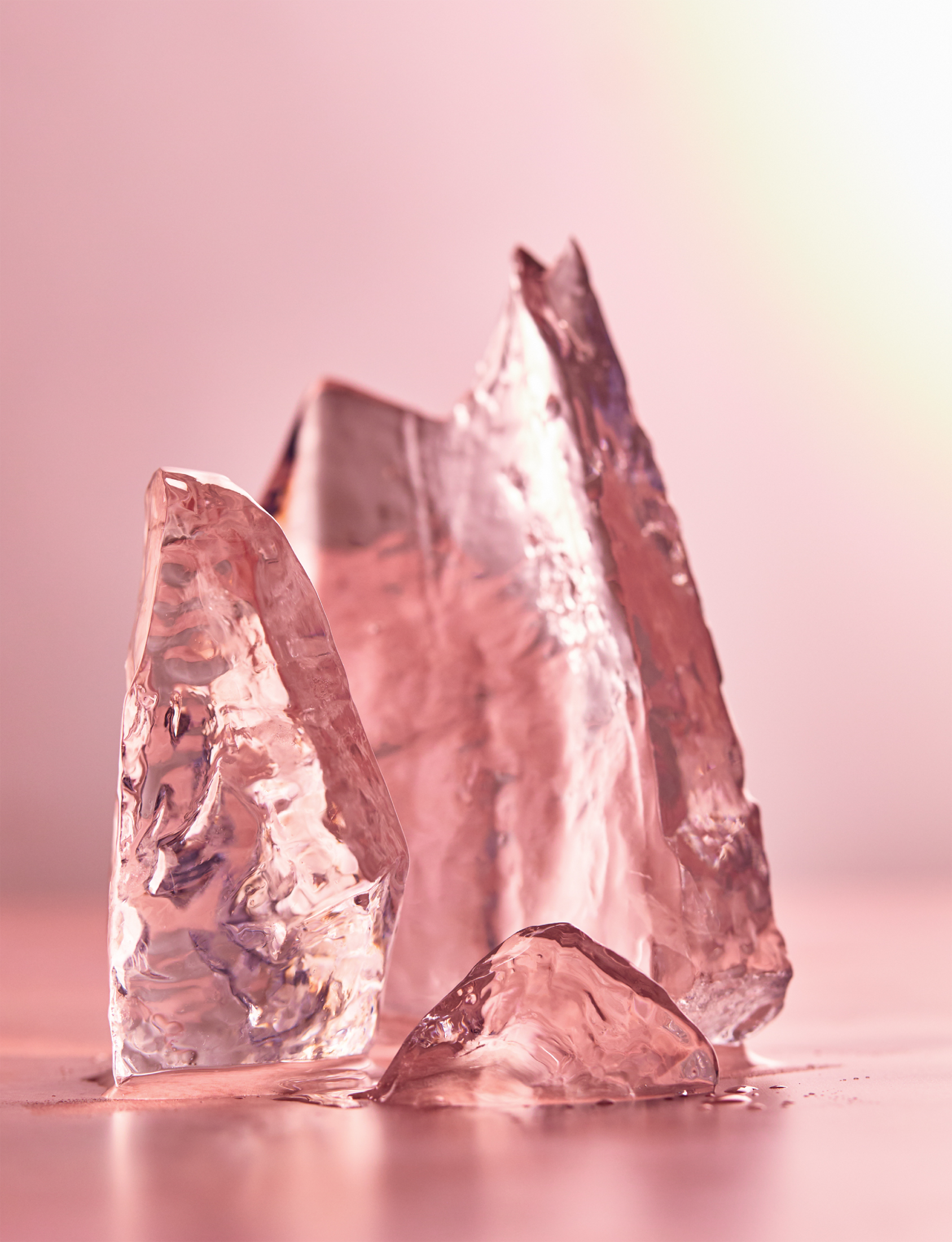
CONTENTS
Cover
Title Page
Copyright
Introduction
Cocktail difficulty rating: an explanation
Quick guide to gin styles
How to… make a simple syrup
Must-have cocktail kit
SPRING
Apricot Blossom
English Garden
Floral Gin Fizzes
Bee’s Knees
Rhubarb Sour
Lavender Lemonade
Lavender Honey Cheesecake
How to … Grow Your Own Garnishes
Cucumber Martini
Breakfast Martini
How to … Host a Gin Tasting
Grapefruit Wheel Punch
White Chocolate Martini
Aviation
White Negroni
How to … Use a Boston Shaker
Rose and Cardamom Cake
Gin and Lemon Roast Chicken
The Distiller’s Guide to … Distillation
SUMMER
Lemon Drizzle Sling
Bakewell Flute
Summer G&Ts
Beach Beauties
Perfectly Pink Summer Punch
The Craft Gin Club Guide to … Hosting a Cracking World Gin Day Party
Passion Fruit Smash
Pink Gin and Strawberry Tiramisu
Ginarita
Gin and Tonic Ice Lollies
Clover Club
How to … Make Your Own Garnishes
Watermelon Gin Punch
Ginny Aperol Spritz
Tom Collins
How to … Perfectly Garnish Your G&T
Gin Barbecue Recipes
Ginology 101: The Distiller’s Guide to Botanicals
A Quick Guide to Glassware
AUTUMN
Bonfire Bramble
Autumnal Smash
Creepy Classics
Bramble
Hedgerow Crumble Bars
Ask the Experts: The Care and Keeping of Gin
A Distiller’s Guide to … Gin Styles
Oktoberfest Punch
How to … Upcycle Your Gin Bottle
Apple Sour
Apple and Cinnamon Gimlet
Pork Fillet With Gin Apple Sauce
Two Negronis
Back to Basics: Using Non-Liquids in Cocktails
Spiced Pumpkin Punch
How to … Make Flavoured Gin at Home
Gin-Infused Tomato Chutney
Smoky Martini
Salted Toffee Martini
WINTER
Craft Gin Club’s Christmas Cocktail
Gin and Ginger
Winter Warmers
Winter G&T
How to … Make the Perfect Gift for the Gin Lover in Your Life
Gin and Orange Glazed Ham Joint
Gin-Cured Salmon
Boozy Cranberry Relish
Blood Orange Sour
The Distiller’s Guide to … Juniper
Mince Pie Martini
Une Très Bonne Année
Sloe Gin Mincemeat
Yuletide Flip
How to … Throw a Gin-Tastic New Year’s Eve Party!
Pomegranate Gin Fizz
Sloe Gin Fizz
Back to Basics: The Golden Ratio
The Last Word
Index of Searchable Terms
Acknowledgements
About the Publisher
INTRODUCTION

Here at Craft Gin Club, we hold one truth close to our hearts: there are fantastic ways to enjoy gin all year round! As the co-founders of the UK’s first (and largest!) gin subscription club, we’ve spent every day since 2015 on a quest to find the very best craft gins and deliver them to gin lovers far and wide. Along the way, we’ve found some absolute crackers and discovered new and exciting ways to serve our favourite spirit.
While we all love nothing more than an ice-cold gin and tonic during the hottest months of the year (or ‘G&T season’, as we lovingly call it around here), we’ve also been amazed at the sheer versatility of gin. From recipes for hot gin in December to party punches perfect for spring, gin is a must-have all year round – and it can even play a part in delicious dinners, cakes and bakes. We know that our tens of thousands of members feel the same. That’s why every month, along with a full-sized bottle of craft gin, we send a magazine chock full of new cocktails, food recipes, crafting ideas and gin knowledge.
But the more we learn, the more we want to share, and a monthly magazine just isn’t enough! That’s why we’ve compiled this book, so that gin lovers across the world can learn more about this spectacular spirit and even more ways to use it. We have collected our favourite cocktails to make at home, alongside fun tips and tricks to help you mix up masterpieces, host gin-soaked soirées and create unforgettable experiences.
While these cocktails, food recipes and craft projects vary in difficulty, every single one is achievable at home. And, though we’ve grouped the cocktails according to the seasons or occasions when we like to drink them most, they’re just like the gin that goes into them – fabulous all year round!
We hope this book will give you the knowledge, confidence and inspiration to put the craft gins in your collection to good use. Happy reading, gin lover!
Cheers!
Jon & John
Co-founders, Craft Gin Club
craftginclub.co.uk
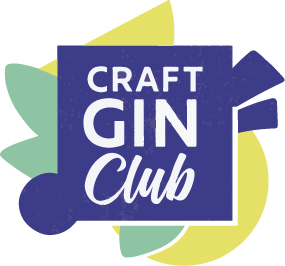
COCKTAIL DIFFICULTY RATING: AN EXPLANATION
Throughout this book, we’ve given each cocktail one of three ratings: easy, medium and expert. Here’s what each rating means.
EASY
An easy cocktail is made using gin and easy-to-find ingredients, like fruit juices and soda water, which are available from your local corner shop. An easy cocktail will also be a snap to make. These drinks have no more than one or two steps.
MEDIUM
Looking for more of a challenge? A medium cocktail will either be made using ingredients that are harder to track down – you may need to go online or to a speciality shop for some of these amazing liqueurs – or have more than one step to completion.
EXPERT
Calling all master mixologists! Expert cocktails require both special ingredients (you may even need to infuse your own gin!) and some more advanced techniques to complete. These tipples are sure to impress, so don’t be afraid to give them a go!
QUICK GUIDE TO GIN STYLES
London Dry, Old Tom … what does it all mean? Here’s a quick guide to gin styles, and what you can do with them.
LONDON DRY
The most readily identifiable style of gin but also the hardest to produce. In 2008, the EU established several rules that gin producers must follow in order to put this label on their bottles. London Dry gins are juniper-forward (i.e. the flavour of juniper predominates) and must be at least 37.5 per cent ABV (alcohol by volume); crucially, no flavours or colours can be added post-distillation, which means the people at the still need to be skilled enough to produce a delicious liquid without any artificial help. There are also limits to how much sweetener can be added to London Dry gins.
OLD TOM
Much sweeter than Plymouth or London Dry styles, Old Tom is the ‘missing link’ between dry, modern styles of gin and genever, the Dutch distillate that came before them. Popular in the eighteenth century, the Old Tom style has seen a revival at the hands of bartenders, who like it for the ‘sweeter something’ the additional herbs and spices give to classic cocktails.
PLYMOUTH
Slightly sweeter than London Dry gins, the juniper flavour in Plymouth gin is also subtler, with greater emphasis placed on ‘root’ botanicals like liquorice and orris. This style must be made in Plymouth – many distilleries used to operate there, but only one remains.
FLAVOURED
Flavoured gins are dominated by a single flavour, which is often added after the distillation process. Raspberry, rhubarb, sloe and elderflower are all popular flavours. Often, the liquid itself will take on the colour of the ingredient flavouring it. To have a go at making flavoured gins yourself, turn to How to … Make Flavoured Gin at Home.
MODERN
A modern gin is one that doesn’t play by any rules. This catch-all term encompasses anything that doesn’t fit into other categories and gives distillers lots of room to manoeuvre. While there are no quality guarantees with modern gins, this category is where some true visionaries are playing – and they have a whole world of flavour at their fingertips!
HOW TO … MAKE A SIMPLE SYRUP
Making syrups – whether plain and simple or in a range of fantastic flavours – is a very straightforward skill that unlocks a whole world of amazing cocktails.
WHAT IS SIMPLE SYRUP?
Simple syrup is a cocktail mainstay, making an appearance on many an ingredients list. These include the French 75, Bramble and the beloved Tom Collins. But what is it, and how on earth do you make it?! Simple syrup is – put, well, simply – a combination of sugar and water, heated until the sugar has dissolved evenly and the texture is thick. Also known as sugar syrup, it’s used in cocktails to balance sharp and sour flavours.
HOW DO YOU MAKE IT?
It couldn’t be simpler: just combine equal parts of caster sugar and water in your saucepan and bring to the boil. Turn off the heat and stir constantly until the sugar has dissolved and the mixture has reduced to a syrupy consistency. Unlike caramel, it’s fine to stir the syrup as it cooks. Remove from the heat and allow it to cool in the pan. Then decant it into a clean, sealable container and store in the fridge for up to 2 weeks.
HOW DO I MAKE FLAVOURED SYRUPS?
Just add a bit of what you fancy into your basic syrup! Whether you’re using lavender, fruit, spices or veg, letting your flavouring cook alongside your syrup will infuse the finished product. Strain before bottling to remove any bits. Try out as many crazy flavour combinations as you can think of. You may hit upon a new classic!
Here’s how to make a few of our favourites …
BERRY SYRUP
250g (9oz) caster sugar
250ml (9fl oz) water
100g (3½oz) fresh berries (raspberries, strawberries, blueberries, blackberries or a mixture)
Add the sugar, water and your choice of berries to a saucepan over a medium heat. Simmer, stirring gently, until the fruit is incorporated into the liquid and you’ve achieved a syrupy consistency. Strain and leave to cool.
LAVENDER HONEY SYRUP
60ml (2fl oz) water
300ml (10½fl oz) runny honey
A few sprigs of fresh or dried lavender
Add the water and lavender to a saucepan over a medium heat and simmer gently for 15 minutes. Strain out the lavender and return the infused liquid back to the pan. Bring to the boil then turn off the heat and add the honey. Stir constantly until combined and set aside to cool.
GRENADINE SYRUP
200g (7oz) caster sugar
250ml (9fl oz) pomegranate juice
2–3 drops of orange blossom water (optional)
Add all the ingredients to a saucepan over a medium heat and simmer until the sugar has dissolved and the mixture is syrupy in consistency. Set aside to cool.
HONEY SYRUP
250ml (9fl oz) runny honey
60ml (1¾fl oz) boiling water
Place the honey in a jar or bowl and pour in the boiling water. Stir constantly until combined and set aside to cool.
GINGER SYRUP
150ml (5fl oz) water
120g (4½oz) fresh root ginger, sliced
150g (5oz) caster sugar
Add the water and ginger to a saucepan over a medium heat and simmer for 30 minutes. Stir in the sugar until syrupy in consistency. Strain and leave to cool.
ROSEMARY AND THYME SYRUP
250ml (9fl oz) water
2 sprigs each of rosemary and thyme
250g (9fl oz) caster sugar
Add the water and herbs to a saucepan over a medium heat and simmer gently for 15 minutes. Add the sugar and stir constantly until dissolved. Strain and leave to cool.
TEA SYRUP
2 teabags (such as Earl Grey, English breakfast or chamomile)
250ml (9fl oz) boiling water
250g (9fl oz) caster sugar
Place the teabags in a saucepan, add the boiling water and leave to steep for a few minutes before removing the teabags. Add the sugar and simmer over a medium heat until thick and syrupy, then set aside to cool.
MUST-HAVE COCKTAIL KIT
We pride ourselves on our cocktail recipes being super-easy to make at home. But, while the blowtorches and centrifuges may be excess to requirements, you’ll still need a few basic pieces of kit … or, at the very least, some handy substitutes!
COCKTAIL SHAKER
Be it a Boston shaker or a three-piece set, a cocktail shaker is the single most important piece of kit in your collection. You can use these to shake and stir, making them super-versatile.
Or you could use … a protein shaker or a plastic water bottle with a watertight lid. Anything that will let you give your liquids a good shake with ice will do!
SPIRIT MEASURE
Most cocktails will call for measures in neat quantities of 25ml (1fl oz) or 50ml (1¾fl oz). A spirit measure is the fastest, easiest way to accurately measure.
Or you could use … a measuring cup (for quantities of 100ml/3½fl oz or greater), an egg cup (for measurements of around 25ml/1fl oz), or a tablespoon (15ml/½fl oz) or teaspoon (5ml/¼fl oz) for smaller quantities. These should more or less get you there. If you have absolutely no way of measuring, try counting out your pour. A three-second pour should be about 50ml (1¾fl oz) – but proceed with caution and use common sense!
MIXING GLASS
A glass or metal container used for stirring a cocktail with ice to help cool it down before straining.
Or you could use … a measuring jug or indeed any kind of container that you can fill with ice and stir things about in.
JUICER
Psst … we’ve got a secret to share! The single easiest way to take your cocktails from ordinary to extraordinary is using freshly squeezed fruit juice. For this reason, a juicer of some kind is an important piece of kit – unless you fancy doing a lot of squeezing!
Or you could use … your hands! This will be harder but needs must. Remember to roll your citrus fruits on the counter or table before slicing in half to release the juices.
BAR SPOON
These long spoons help you to both measure out and stir your cocktail ingredients, without needing to stick your fingers into your drink.
Or you could use … a standard teaspoon. This will give you about the same measure as a bar spoon, and a standard spoon will do the mixing just as well.
STRAINER
Whether you’re shaking or stirring cocktails, with ice, odds are you’ll need to strain them.
Or you could use … a spoon! This isn’t an exact science (and can get a bit messy!) but if all else fails, hold back the cubes of ice with a spoon while you pour your cocktail into the glass.
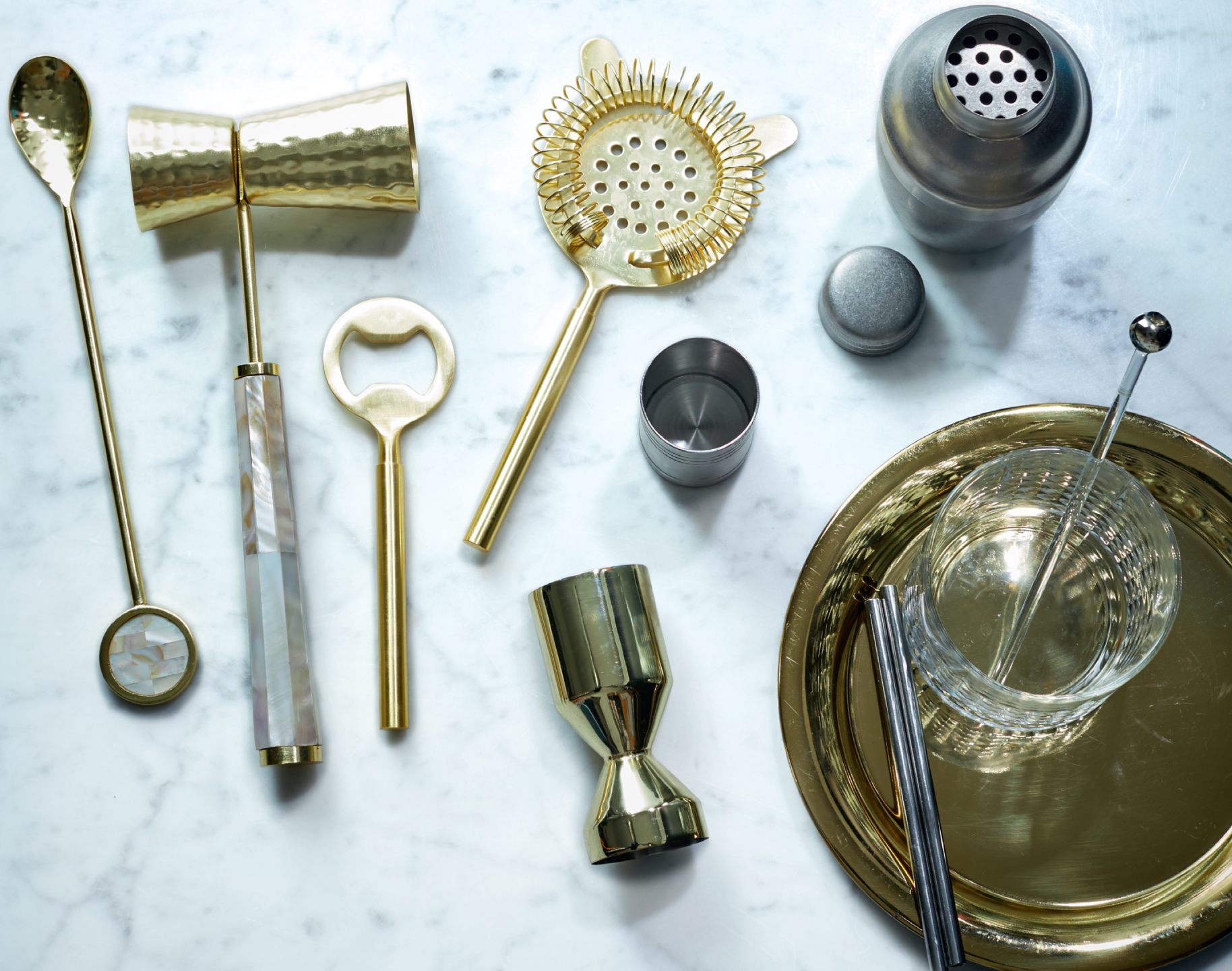
SPRING
The sun is shining (sort of!) and the world is coming back to life. These recipes will bring a taste of spring – flowers blooming, bees buzzing and fruit ripening – into your kitchen and gin glass.
APRICOT BLOSSOM
A zingy, springy cocktail to celebrate the fresh shoots of a new season.
SERVES 1
EASY
50ml (1¾fl oz) gin
1 heaped tsp apricot jam
1 tsp runny honey
1 tbsp grapefruit juice
1 tbsp fresh lemon juice
Fresh basil leaves, to garnish
Add your gin to a cocktail shaker. Stir in the jam and then the honey until both are dissolved. Add the grapefruit and lemon juices and pack the shaker with ice. Shake, strain into a cocktail coupe and garnish with basil leaves to serve.
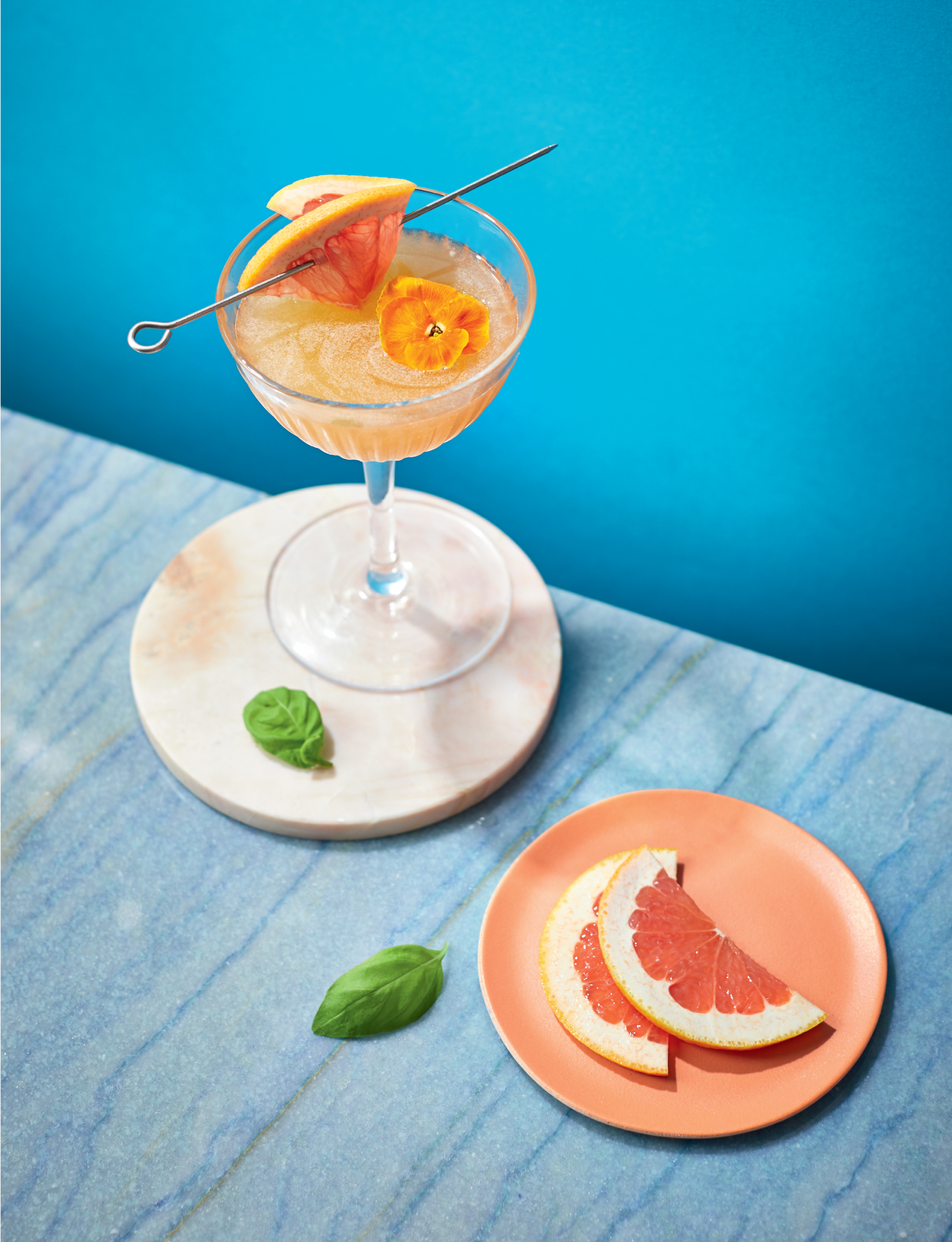
Apricot Blossom
ENGLISH GARDEN
Step outside – spring is here! This floral refresher is the taste of the world coming back to life.
SERVES 1
EASY
50ml (1¾fl oz) gin
25ml (1fl oz) elderflower cordial
75ml (3fl oz) apple juice
Slices of cucumber, to garnish
Add the liquid ingredients to a cocktail shaker and fill with ice. Shake and then strain into a highball glass packed with ice. Garnish with slices of cucumber and serve!
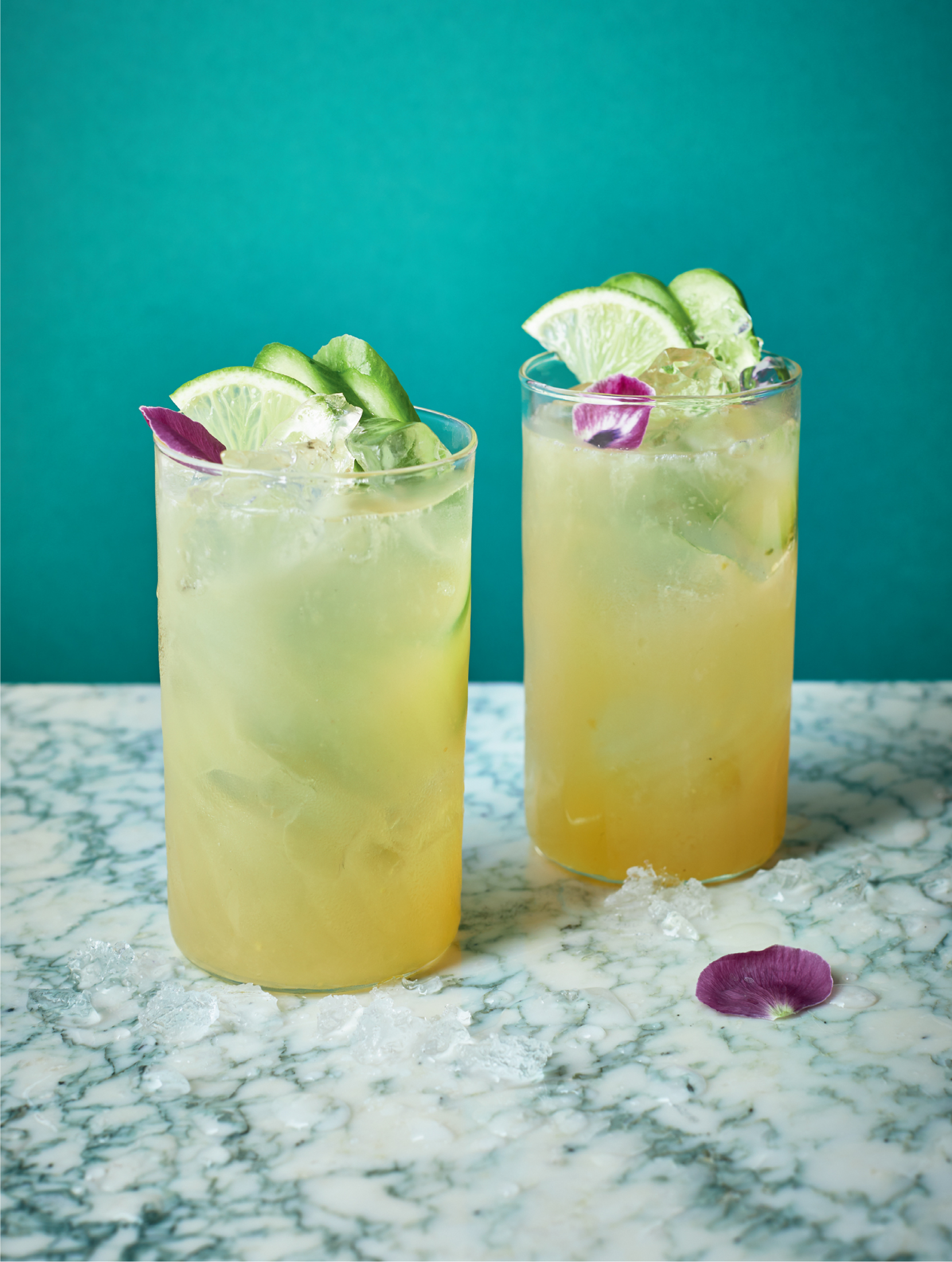
English Garden
FLORAL GIN FIZZES
The classic gin fizz is just four ingredients: gin, lemon juice, simple syrup and soda water. Add in a dash of floral flavour for an easy, refreshing way to welcome spring.
CHAMOMILE GIN FIZZ
SERVES 1
MEDIUM
50ml (1¾fl oz) gin
25ml (1fl oz) fresh lemon juice
3 tsp chamomile syrup (see tea syrup)
Soda water, to top up
Slice of lemon, to garnish
Combine the first three ingredients in a cocktail shaker and fill with ice. Shake and then strain into a highball glass and top up with soda water. Garnish with a slice of lemon and serve.
ELDERFLOWER GIN FIZZ
SERVES 1
EASY
50ml (1¾fl oz) gin
25ml (1fl oz) elderflower cordial
Soda water, to top up
Slice of lemon, to garnish
Fill a highball glass with ice. Combine the gin and elderflower cordial in a cocktail shaker and pack with ice. Shake and then strain into your prepared glass before topping up with soda water. Garnish with a slice of lemon and serve.
BEE’S KNEES
Sweet like honey and tart like lemon, this classic cocktail celebrates the amazing work of our favourite sign of spring: bees! Whether citrus-forward, as in the original recipe, or with a floral twist, this is the perfect tipple for late in the season, when the clocks have gone forward and the evenings are getting ever longer.

